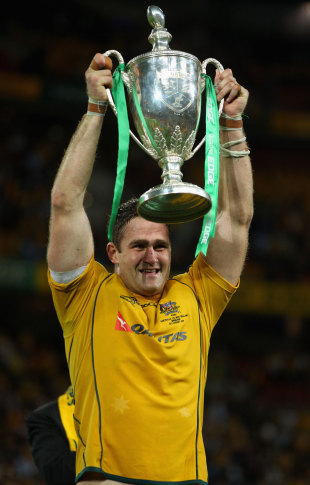|
Comment
A worthwhile excursion
Keiran Smith
December 5, 2011

James Horwill has established himself as the Wallabies' natural skipper in 2011
© Getty Images
Enlarge
The end of year British tour has been a stunning success for Australian rugby. Not only did it go some way to refilling the Australian Rugby Union's coffers after a financially draining year, it also showed the Wallabies are learning how to be ruthless. An attacking exhibition against the Barbarians was followed by a sterner test of resolve in Wales. On both occasions the Wallabies got the job done. And impressively so. The Barbarians hit-out was more froth than substance, especially with so many of the squad's World Cup winners still in party mode. The Wallabies used the match to trial a new midfield pairing of James O'Connor and Berrick Barnes, and to great effect. The twin pivot formation allowed the Wallabies to shift the ball quickly and exploit some half-hearted defending in the backline. Danny Cipriani's impersonation of a hologram in defence certainly helped at times, but the backline moves still needed to be executed and the second half was an exhibition of attacking rugby that boosted the Wallabies confidence ahead of the trip to Millennium Stadium. Perhaps the only thing the Wallabies can learn from that game is James O'Connor need to find a more time-efficient kicking style, after Peter Stringer managed to charge 30 metres from the goal line and pick the ball up from the kicking tee, during O'Connor's drawn out kicking sequence. Mind you, O'Connor kicked eight from nine attempts and that's what matters most. By skipper James Horwill's own admissions, the Wallabies have not always been able to find their way out of the tight spots, but in Cardiff they certainly did. Down at half-time to a Welsh team feeding off the incredible passion accompanying Williams' final test, it would have been easy for the Wallabies to succumb to a 'valiant' defeat. But this time they seized on Leigh Halfpenny's sin-binning to show a new found ruthless streak. Three tries in 10 minutes will win any game of international rugby, regardless of whether it's Wales or even the world champion All Blacks. Taking full advantage of the opposition's weakness is how to win the big matches, and the Wallabies have shown that they're learning. Finding a way to win without David Pocock, who suffered an ankle sprain in the first half, was another step forward for this squad. Against Ireland in the World Cup the Wallabies were brutally exposed by the Irish back-row and they failed to compete at the breakdown. In Cardiff, however, Ben McCalman, Radike Samo and Ben Higginbotham stepped up and dominated the the ruck in the second-half. The scrum also won its' battle, giving some credence to Berrick Barnes' claims that the Wallabies can be the number one ranked team by the end of next season. Despite the lingering disappointment of a World Cup campaign that failed to live up to (perhaps too higher) expectations, 2011 has been a successful year for Australian rugby. The Queensland Reds' stunning victory in Super Rugby, showed the 'running game' is still very much alive and a force to be reckoned with. With the fans buzzing on the back of the Reds triumph, the Wallabies failed to build on the momentum by falling to an inspired Samoa in the first Test of the season in what also turned out to be the death knell for Matt Giteau at international level. There was always an uneasy relationship between Giteau and Robbie Deans and the 92-Test veteran eventually fell out of favour after one of the Wallabies worst ever defeats. But as has been the character of this team under Deans, they bounced back in the Tri-Nations to record memorable victories in Durban against the Boks and the All Blacks in Brisbane to claim their first major piece of silverware since 2001. It was also a stunning debut as captain for James Horwill, who has brought plenty of passion to the leadership role. Yet, despite inflicting a significant psychological blow on the World Cup favourites, the Wallabies couldn't capitalise when it mattered most - at the tournament itself. While the Wallabies won nine of their 13 Tests in 2011, plus the rout of the Barbarians, the team crucially didn't find its peak form in New Zealand. Partly to blame is the selection policy of playing a defensive minded inside centre ahead of Berrick Barnes. By having only one playmaker in the guise of Cooper, the Wallabies attack was easy to work out and in the big matches against Ireland, South Africa and New Zealand, the Wallabies scored just one try and that was a lucky one against the Boks. As in 2007, the scrum again failed in the big matches to provide a platform for the backline to attack and serious thought and decisions about how the Wallabies approach this area is needed in 2012. The recent UK tour showed that perhaps the lessons of the recent past have been heeded. But we'll have to wait until 2012 to find out. © ESPN Sports Media Ltd.
|
Live Sports
Communication error please reload the page.
-
Football
-
Cricket
-
Rugby
-
- Days
- Hrs
- Mins
- Secs
F1 - Abu Dhabi GP
Abu Dhabi Grand Prix December 11-131. Max Verstappen ()
2. Valtteri Bottas (Mercedes)
3. Lewis Hamilton (Mercedes)
4. Alexander Albon ()
5. Lando Norris ()
6. Carlos Sainz Jr ()
-
ESPNOtherLive >>
Boxing - Nelson v Wilson; Simmons v Dickinson; Joshua v Gavern (Metro Radio Arena, Newcastle)
Golf - Houston Open
Snooker - China Open
Tennis - Miami Open

